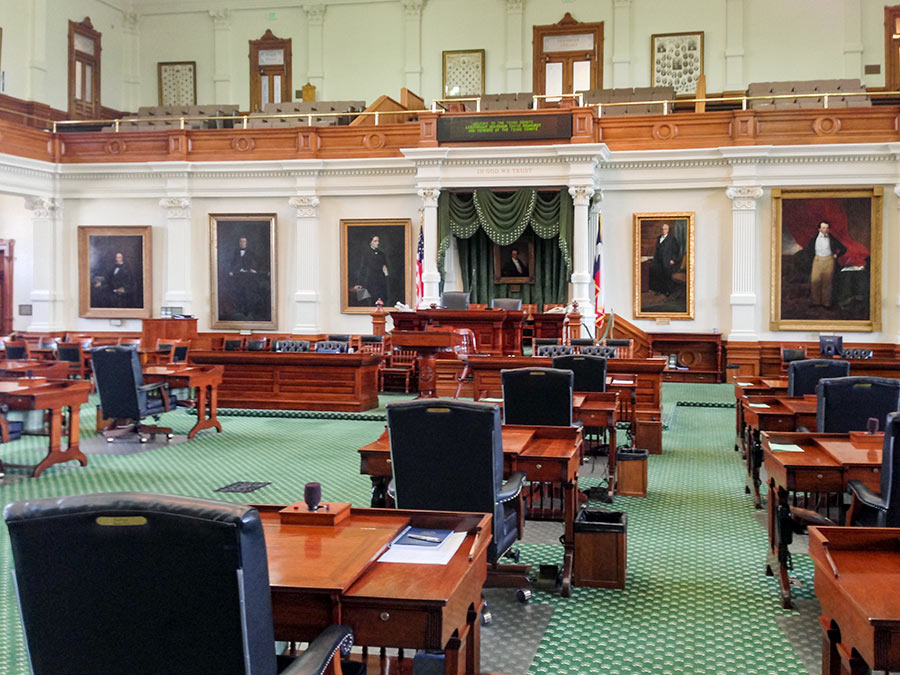LYFT PREPARES TO DIVE BACK INTO HOUSTON, WOOS DISGRUNTLED UBER DRIVERS AT IAH  Barring an out of character veto from governor Greg Abbott, that Texas law that Uber and Lyft have been angling for (the one that would stop cities from requiring more stringent background checks on their rideshare drivers, like Houston did) should go into effect shortly, now that the state Senate has passed the measure with more than 2 thirds support. Lyft pulled out of Houston in late 2014 over the local rule change, while Uber just made some noise about doing so. Meagan Flynn reports for the Press that a Lyft rep was spotted in a waiting lot at IAH on Monday passing out business cards to Uber drivers, some of whom were on a brief strike over wages and company policies. The rep said the company would be back in town soon, if the bill becomes law; the company has also put out a few job ads for Houston operations staff. [Houston Press; previously on Swamplot] Photo of Radiant Fountains sculptures near IAH: elnina via Swamplot Flickr Pool
Barring an out of character veto from governor Greg Abbott, that Texas law that Uber and Lyft have been angling for (the one that would stop cities from requiring more stringent background checks on their rideshare drivers, like Houston did) should go into effect shortly, now that the state Senate has passed the measure with more than 2 thirds support. Lyft pulled out of Houston in late 2014 over the local rule change, while Uber just made some noise about doing so. Meagan Flynn reports for the Press that a Lyft rep was spotted in a waiting lot at IAH on Monday passing out business cards to Uber drivers, some of whom were on a brief strike over wages and company policies. The rep said the company would be back in town soon, if the bill becomes law; the company has also put out a few job ads for Houston operations staff. [Houston Press; previously on Swamplot] Photo of Radiant Fountains sculptures near IAH: elnina via Swamplot Flickr Pool





Good. Any competition to Uber is good -as Uber’s founder is a TOTALLY insecure,, conniving, prima donna,VERY insecure anal orifice !!!
I’m just glad a bunch of small town folks have a right to tell us big city slickers what are and aren’t acceptable safety policies to be implemented for living in one of the largest and most dangerous cities in america.
.
though i don’t really care either. don’t use any of this stuff outside of work.
Happy, if there was such a thing as protective services for keyboards, yours would be confiscated…..
@joel – In this case I am glad that the state is stepping in to corral a city rule that serves to protect and outmoded business, restrain innovation, and limit residents’ choices. If people are concerned for their safety when using a ride sharing service, then the answer is simple. Don’t use the ride sharing service.
“One of the largest and most dangerous cities in America”? Largest yes, but MOST dangerous? Using what metric? And the statistics to back up that claim?
it still blows me away that it is somehow cheaper for lyft and uber to spend all that money lobbying to remove background check requirements than it is to just pay for background checks to meet the requirements. and somehow it works and legislators roll over and remove background check requirements. maybe im missing something.
@questionmark – I don’t think it is a matter of cost, at least not directly. A key strategy of Uber and Lyft is to have as many people as possible sign up to be drivers to add to the “fleet” in times of high demand. The background checks make it more difficult for anyone to sign up as a driver, whether they would pass the check or not, thus limiting the number of people that will even bother. Cities like to be gatekeepers and taxi drivers and their owners tend to like the protection from competition. I’ve been in many jurisdictions with more stringent requirements for cab drivers than Houston where they couldn’t understand the native language and I had to help them find my destination. So that is to say, I doubt the sincerity of the expressed concerns for public safety.
@ joel: From a practical standpoint, allowing individual municipalities to regulate the existential nature of cabs, jitneys, rideshares, charter buses, etc. has the effect of creating a patchwork of regulations which is confusing and potentially very inefficient. Regulation in one municipality can easily impact the quantity, quality, and price of services in adjoining municipalities and unincorporated areas, and these overlapping external effects have the potential to be so limiting as to effectively constitute a regional ban on the service whether that had been the intention or not. This is, therefore, certainly an area where a legislative framework created by the State would be useful.
.
Additionally, I would be very concerned that local control of this issue would likely give rise to corrupt practices. This is not to say that every state legislator comes to the issue with entirely clean hands…but…the State would be a perennial target for “lobbying” in any case. Any municipality with regulatory authority that announces its intention to delve into the muck of this issue would be a magnet for “lobbying” from outside economic interests. That’s certainly not desirable.